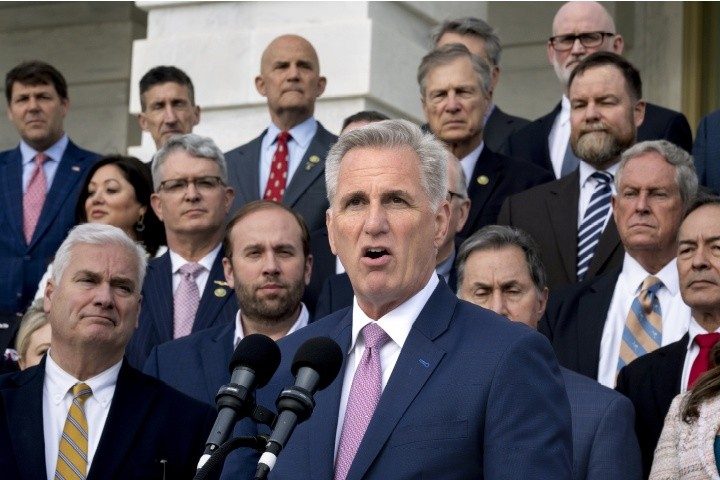
Speaker of the House Kevin McCarthy (R-Calif.) spoke at the New York Stock Exchange on Monday, revealing a budget plan that would allow a debt-ceiling increase and keep the federal government from facing default.
“Here’s the plan: The House will vote on a bill to lift the debt ceiling into next year, save taxpayers trillions of dollars, make us less dependent on China, and curb high inflation — all without touching Social Security or Medicare,” McCarthy tweeted.
McCarthy outlined spending cuts that he knows Republican House Freedom Caucus members are demanding in exchange for voting to raise the federal government’s $31.4 trillion debt ceiling. The budget plan seeks to cut spending back to last year’s levels, and cap future spending growth at one percent a year over the next 10 years.
In February, McCarthy met with Biden, where they had a “frank and straightforward dialogue” on the debt limit and government spending. This was after Treasury Secretary Janet Yellen took “extraordinary measures” to ensure the federal government would not default, buying Congress and President Biden time to agree to raise or suspend the statutory debt limit to keep the government solvent.
“The Treasury Department has warned that the federal government could hit the ‘X-date,’ when it is no longer to pay all its bills as early as June 5, while the nonpartisan Congressional Budget Office forecast that moment would come sometime between July and September,” reported Reuters.
Since their meeting, Biden and McCarthy have held their ground with opposing views on resolving the debt-ceiling crisis that will most likely become a standoff leading to a default that would rattle the U.S. and world economies. The likelihood of a default is growing with the ongoing budget standoff. Reuters shared that “a market-based gauge of the risk of a U.S. default is the highest since 2012, and has climbed sharply this year as the debt ceiling debate has intensified in Washington.”
Biden submitted a $6.9 trillion budget proposal in March, which would continue to grow government and would most likely increase the nation’s debt. A White House fact sheet stated, “the Budget proposes smart, targeted investments to grow the economy from the bottom up and middle out, not the top down, by investing in America and its people — investing in the foundations of our country’s economic strength; confronting the climate crisis while creating clean energy jobs; and advancing equity, dignity, and opportunity and strengthening our democracy.”
Republicans quickly dismissed Biden’s budget, according to Reuters, stating, “President Joe Biden’s budget is a reckless proposal doubling down on the same Far Left spending policies that have led to record inflation and our current debt crisis.”
McCarthy added to the rhetoric Monday, stating in his speech, “Our national debt is too high. Far too high. And the problem is getting worse, not better. Mr. President, enough is enough — stop playing partisan games. Defaulting on our debt is not an option.”
Senate Majority Leader Chuck Schumer (D-N.Y.) responded to McCarthy’s speech, tweeting, “Democrats want to avoid defaulting on our country’s debts. Meanwhile, Speaker McCarthy continues to bumble us towards a catastrophic default that would cause the economy to crash, spike job loss, and raise costs for American families.”
Default shouldn’t be an option, but it currently appears unlikely that Biden will negotiate a budget compromise with McCarthy’s Republicans to avoid one. So, McCarthy will have compromise with Democrats and fiscally conservative Republicans and submit a budget proposal that would pass the Senate and gain Biden’s signature.
Seeing what the Republicans can actually bring to the House floor is the next step in the budget process, a step that we all can hope will end the finger-pointing and partisan politics.


